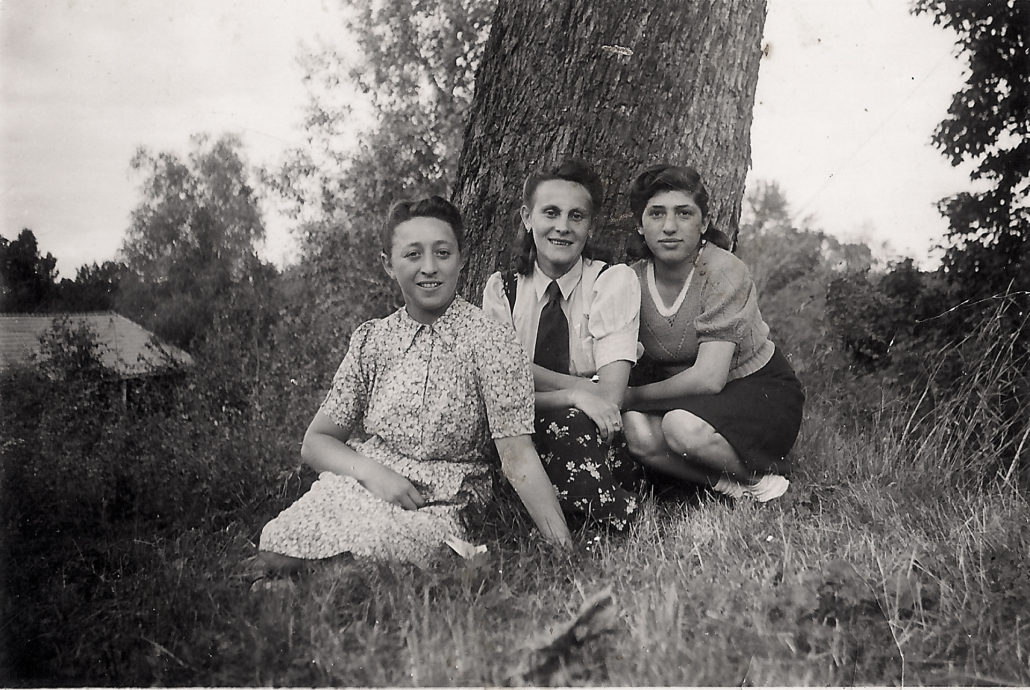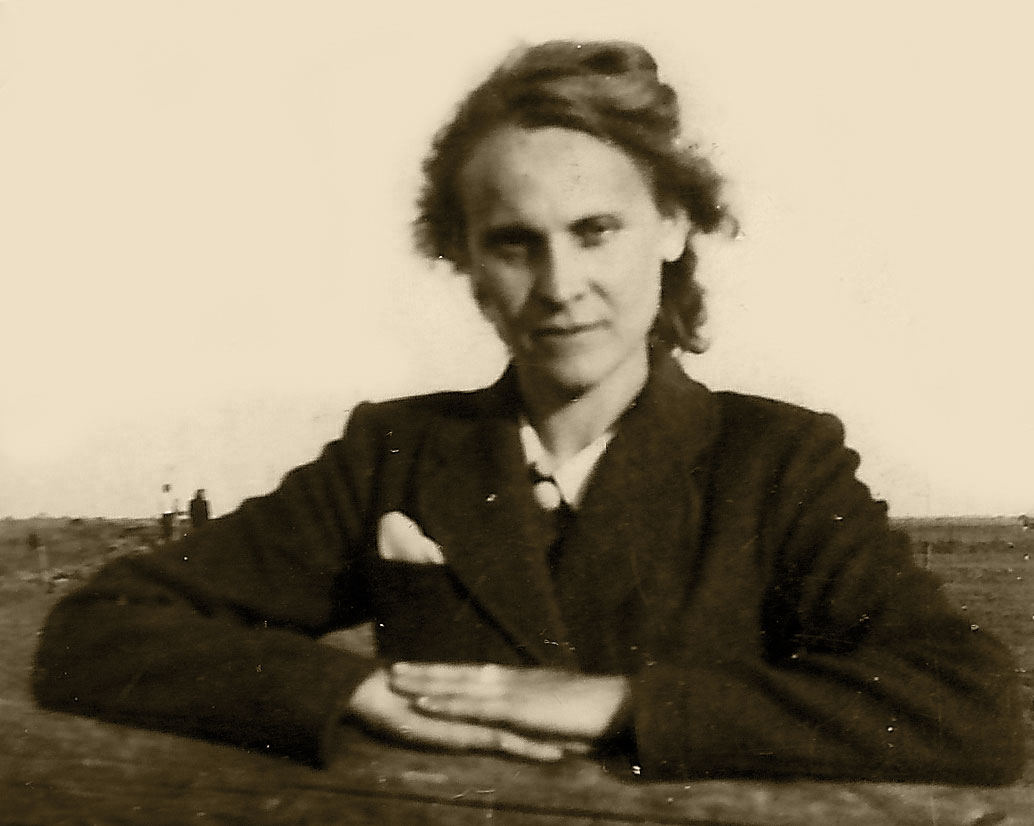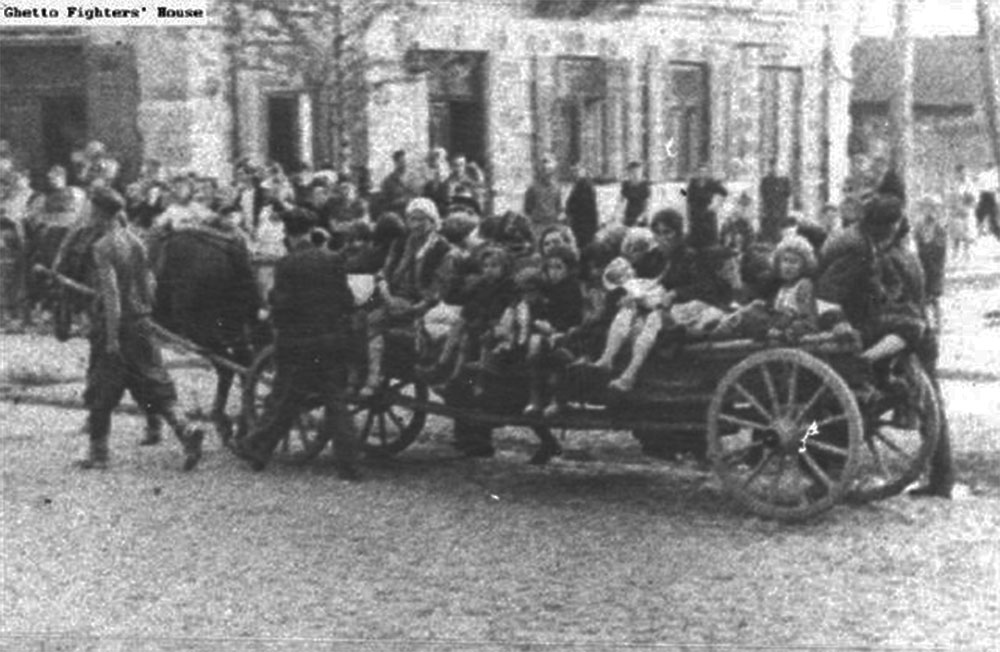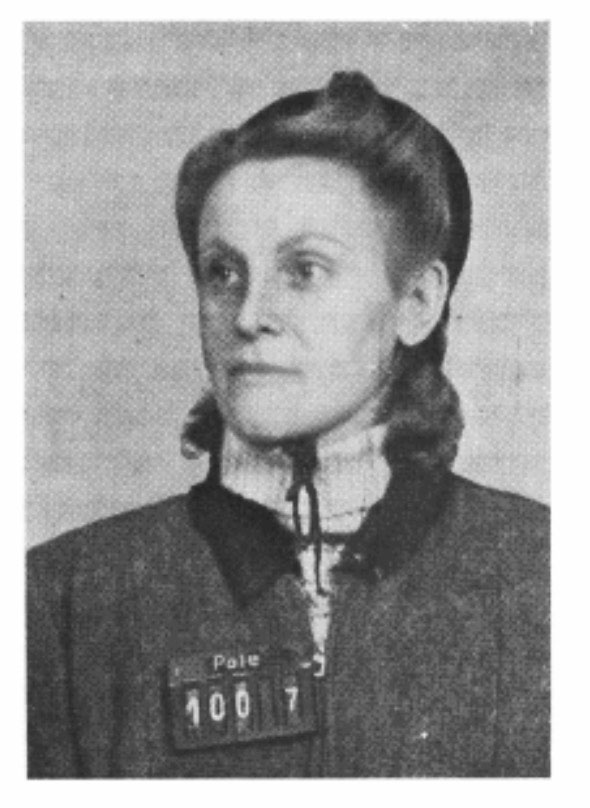How I Lived Through It All
By Bracha Zilberberg- Rosenbaum
Translated to English from Yiddish by Viktor Lewin
I lived through the occupation; the entire terrible Nazi period. How this was possible only I can understand – barely twenty years of age, I had the misfortune of suffering through both Ghettoes in Losice, of witnessing both liquidations (big and little), and I was taken along with the others during the last one. It was possible to live through such a misfortune. I will try to relate certain events during this time, living through those nightmare years, even though I see everything as in a dream and many things which were lived through only we see, in perspective of those times, as unthinkable.
I was in Losice when war broke out and when the Germans occupied the shtetl. At the beginning of the tragedy, in August 1942, three weeks before the first liquidation, the Judenrat sent me, with ten other girls, to do field work in Kobylany, 15 kms. from Losice. With me there was Razl Zilberman, Elke Grosman, Sara Liberman, and Esther Elzon. We worked for a good Polish overseer, and we lived together in a wooden shack. Sunday mornings we would go to Losice for the whole day and come back in the evening, so that we could go to work on Monday morning.
Saturday August 22nd I didn’t feel good and didn’t go out to work in the fields. Around 2 P.M. Razl Zilberman came running into the barracks, crying, and told us that a peasant coming from Losice told of lakes of blood in the shtetl. Jews were being shot and killed.
When the overseer, for whom we worked, heard what was happening in Losice, he telephoned the German Work Office, asking them what he should do with us. He was told that he should hide us and not let us out of the barracks.
Up to Monday Aug. 24th we were “arrested.” We didn’t know what was happening in Losice! What was to become of us? We couldn’t do anymore than cry- not even talk among ourselves, we just looked at each other; our hearts “bled” and tears poured.
Monday morning the overseer told us to go to work. As if we were going to live? We asked ourselves. We worked in silence for many hours. Then, a wagon full of Germans came to the fields. We were told to sit in the wagon which then proceeded onto Losice. We were sure that our last hours were upon us. We couldn’t cry anymore, we just sat in silence and blessed each other with our eyes.
The wagon drove unto the streets in Losice and stopped in front of the Broiz. Out walked a German officer. We were preparing ourselves for the fate that we would be shot. Shtoita drove us through the town square, parcels of food were strewn on top of the blood-stained stones and possessions of those who were killed. We were driven up to the house of Bunem Vainman.
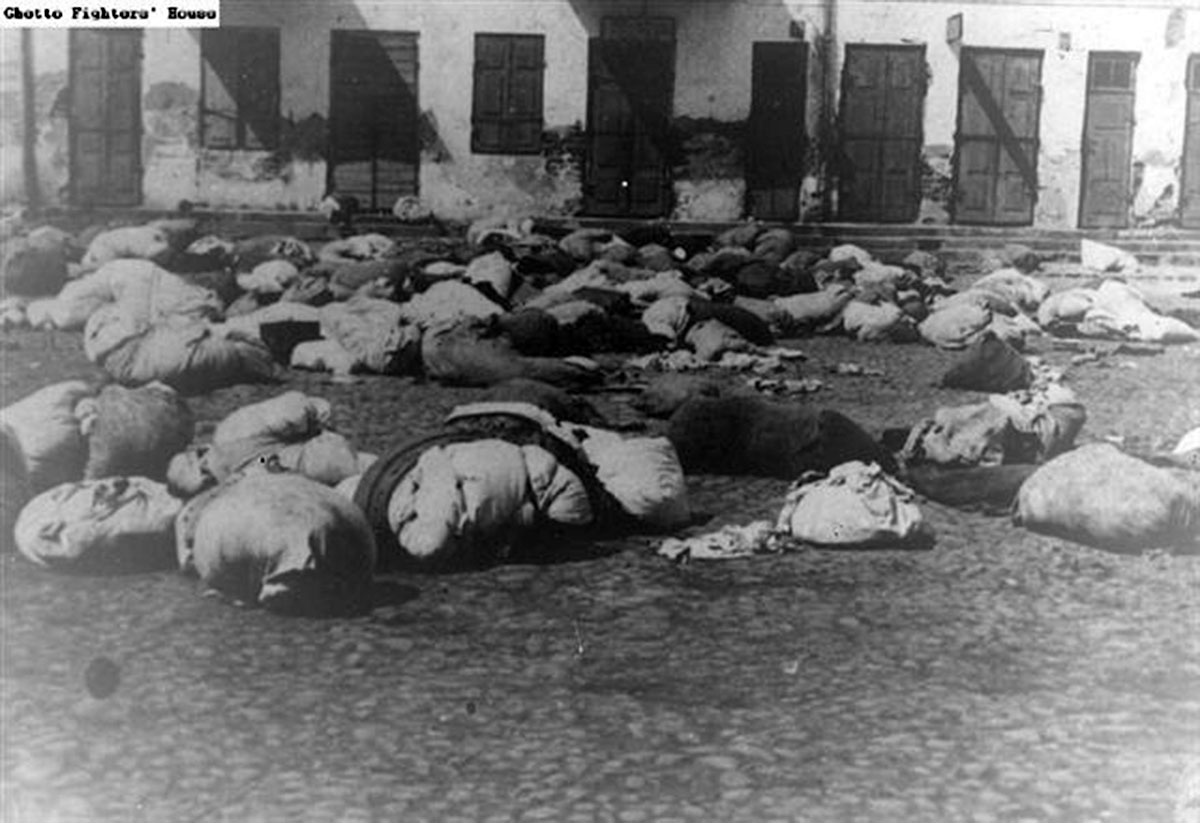
Jews’ belongings deserted in the streets of Losice, Poland following deportation. August 1942 Source: Ghetto Fighters’ House Museum
Jews’ belongings deserted in the streets following deportation. August 1942
Source: Ghetto Fighters’ House Museum
In this house we met 20 other girls, but no men, but among them not one from Losice. What had happened to the Losicer Jews, not one of them knew ?
First thing on the second day, some Losicer Jewish policemen came back from Siedlce and from them we learned of the bitter details.
And so it began, several months of painful life in the small Ghetto. We all knew what was awaiting us, and everyday we prepared ourselves for the bitter fate. Fradl Rozenboim found me here.
Two old Jews were with us in the small Ghetto: Basha and Aitshe – Mair Rozentzsveig. The latter was terrified by the first liquidation and hid between two walls in his house over the store. He had enough food and drink for a long time. The Poles searched for him. The Germans were called to help, who then in turn brought him to us in the small Ghetto. When we were later liquidated, both of the elderly Jews were led out of the Ghetto bound together by their Tallit, and so they went on their last” journey”.
I, together with Fradl Rozenboim, Elke Grosman, and Sara Liberman were sent by the Germans to do field work in Dzshiatkovski, a village between Losice and Mezritch. Two days before the liquidation of November 22nd, we were brought back to the small Ghetto. Only Fradl saved herself with a fake Polish passport, and didn’t return with us.
On the 24th of November 1942 we were, all the inhabitants of the small Ghetto, taken to Niemojki and from there, in overflowing wagons, to Siedlce. At the train station in Siedlce the Gestapo hit us and shot at us, and then we were taken to a camp 3kms. from Siedlce. There were three houses full with those sentenced to Treblinka. One, full of gypsies and two with Jews. We found a spot in the attic of one of the houses. There were many Jews from many towns and villages. We all knew what fate awaited us with the understanding that we had been judged and sentenced to death.
The houses, at night, were surrounded by the Germans, who would shoot through the windows. In the morning we were forced outside, and once outside, shots were fired over our heads. The Losicers would stay together as long as possible. Next to me was Elke and Sara. Sara (Liberman) was shot in the ear, which bled profusely. When I asked if it really hurt, she said,” It’s a pity that they didn’t shoot me a little higher, in the temple, then it would be over.”
They then forced us to the train and stuffed us into loaded boxcars. The doors were locked and the train moved. I fell in between several older women. They immediately pushed me towards the window:” Jump out, you are young- physique like a Gentile.” They didn’t give me any time to think about it. One of the women took off a brilliant ring, put it on one of my fingers and threw me through the hole – the window. I remember it as a dream; how I flew. Around me bullets were flying as I fell into the soft snow.
This November 28th, early in the morning. I woke up, felt myself to find out if I was wounded. I went through the snow-filled field along the side of the nearby village. I didn’t have the courage to knock on a door…. I spent the night, awake in a shed, on the edge of the village. In the morning I was met by the peasant-farmer, the owner of the shed, he chased me away, not even given the chance to warm myself. A second peasant-farmer did allow me into his shack, let me warm myself, gave me something to eat, but urged me to leave quickly…
“Where should I go?”
I asked myself this question on the way to Mordy, while thinking about returning to Losice. I walked for 40 kms. Along the way I knocked on some doors, but the people did not want me to come in – recognized, as a Jew…. in Mordy, a poor peasant did give me something to eat. The town was empty, robbed, with blood on the cobblestones; not one Jew.
I went further through the village of Skalimowo, which was very familiar to Losicers – here I was also turned away. Around eight o’clock in the evening, I was feeling like a chased dog, going into the forest around Skalimowo, a place very familiar for our youth outings. I laid down, like an animal, on the grass and once again had a good cry. ” What more could I have done?” This settled me down a little, ” lightened my load “, and in the dark I continued walking.
Late at night I arrived at the village of Suchowolce, completely without any possessions. I knocked on the door of the first shack in which there was light. The door was opened by a middle-aged Polish woman. She looked at me suspiciously, recognized that I was a Jew in trouble, but gave me food, didn’t ask anything, let me wash up and laid down in a warm bed to sleep.
In the morning the Polish woman came to me, Ostapova, was her name; she had demonstrated her friendliness to a guest. She had two daughters; one was called to go to Germany to work. She asked me if I didn’t want to go in her daughter’s place, along with her documents, I accepted right away. The woman gave me peasant dress, packed some food for me, as for her own child, and drove me, as a mother would, to the Work Office of the Germans in Mordy. I studied well my new Polish name, my ancestors, the names of my parents, Zaida – Boba….. but writing it was difficult, my heart was throbbing, but I was happy that I passed the exam, and was taken on as a Pole, Lukashuk, to go and work in Germany.
Along with other Poles the train took us from Mordy to Siedlce. A Polish maid from Losice, Olimpka, was also included in the group which went to Germany. She recognized me immediately….. I took hold of her arm, turned her around; she did not denounce me. After a while I knew that either willingly or not, I was at risk that she may say something which would reveal my secret. Luckily for me the commission in Warsaw, through which all candidates had to pass also included Olimpka, and I lost sight of her.
I worked at an airplane factory in Germany. It is easy to recall my surprise when I came to work for the first day, and at the same table, where I was told to sit, I met a Polish girl from Losice, Kasianikvona… I thought that I would pass out on the spot.
She, however, did not recognize who I was; surviving the last few months had noticeably left “impressions” upon my face, changed it, aged it, and made it look “important.” For several days I was worried whenever she looked at me – she really did not recognize me and I calmed down.
Under the guise of a Polish girl, I worked in Germany for two and a half years. Not giving cause to do so, the director never scrutinized me. The Gestapo, however, watched us and often wanted information from us, checked our documents (birth certificates included). However, I survived it all. I, along with five other girls were picked from 200 to be sent to a Folks course, which took place during the day. The work was difficult, with 12 hour days, with little to eat. But I survived until the English liberated the area around Hamburg where the factory was located.
When I was liberated I went to the Jewish community in Hamburg and pleaded with them to be registered as a Jew; they did not believe me. They looked over my Polish documents, at my Gentile- looking face, and wanted me to show them that I was really a Jew. I was given a Siddur [Jewish prayer book], and was asked to pray/read. With tears in my eyes I began to pray; only then did they change their minds.
Later, I relived this same experience in Bergen – Belsen. In the camp I was passed over because they thought that I was really a Pole. I had to prove that I was a Jew all over again, so that I could take advantage of the help being offered by the Joint.
I felt as though I was in exile among Jews…. in the end I was sent to Sweden, and from there I came to Israel.
